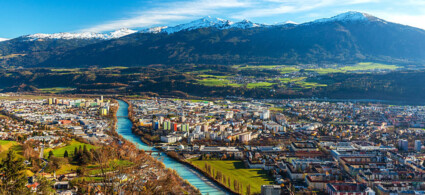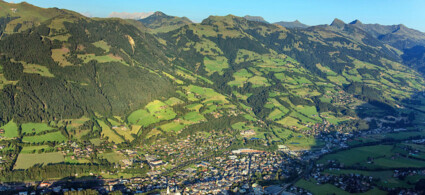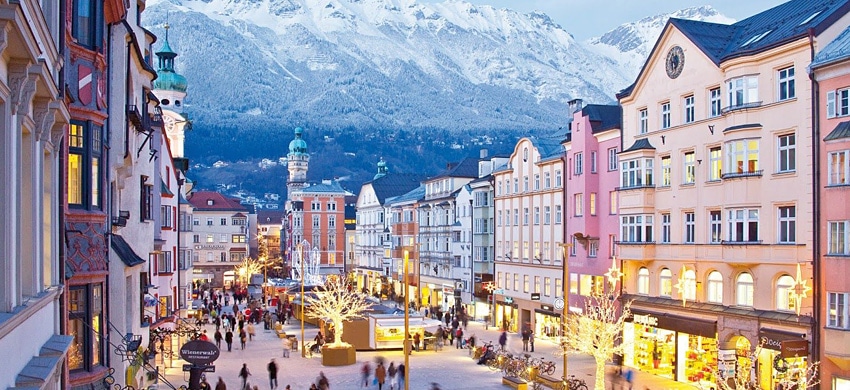

Tyrol is one of the most touristy regions in Austria, unquestionably one of the most beautiful. A holiday destination 365 days a year, with ski slopes for the winter and hiking and mountain biking trails for the summer, but also plenty of art, culture and beautiful villages that bring to mind the most typical Austrian stereotypes. A region that manages to captivate from the first glance, that enchants and amazes, but always with the discretion that characterises these parts of Europe.
Let yourself be captivated by the beautiful Innsbruck, its capital, and reach the summit of the region’s splendid mountains, such as the Bielerhohe, the Zugspitze and the Jakobskreuz. Some of Tyrol’s resorts have made modern skiing history, such as Kitzbühel, Solden or Mayrhofen, while those who like to have fun even after skiing should head straight for Ischgl, Europe’s capital of snow fun.
But Tyrol is also art and culture: visit Ambras Castle, or the incredible Swarowski Kristallwelten, the factory-museum of the famous crystals. Then don’t miss the enormous Tratzberg castle, which covers 5000 square metres, or the Kufstein fortress on the German border. If you can, take a break in one of the small Tyrolean towns, such as Lienz, Hall in Tirol, Rattemberg or the aforementioned Kitzbühel; you will find warm atmospheres, beautifully decorated houses, open-air cafés and plenty of souvenir shops.
Tyrol proper is actually made up of two separate areas, called Nordtirol (North Tyrol) and Osttirol (East Tyrol), both mountainous and located entirely within the Eastern Alps.
Nordtirol is the larger of the two, and occupies a large part of the south-western part of Austria. It borders South Tyrol ( South Tyrol in German) to the south, the German region of Bavaria to the north, while the eastern and western borders are with Vorarlberg and Salzburg, respectively. For a handful of kilometres to the south-east, it also borders Switzerland.
The small area of Osttirol is instead an exclave of Tyrol, separated from Nordtirol by a piece of Salzburg and a piece of South Tyrol. Osttirol coincides entirely with the district of Lienz; the other eight districts of Tyrol are all in Nordtirol.
Tyrol is an ideal holiday destination, as it can be fully explored in one or two weeks, or savoured in a weekend. Winter or summer, here is a list of the most beautiful things to see in Tyrol, to enjoy this magnificent region of Austria at its best.

We begin our review of things to see in Tyrol with Innsbruck, its capital and Austria’s fifth largest city. You will be amazed by the beauty of this city, which you can also elect as a base for visiting the whole of Tyrol on various day trips.
Start your tour of Innsbruck at the old bridge over the river Inn, which gives the city its name (‘bridge over the Inn’ translates as Innbrucke in German, from which Innsbruck derives), then stroll along Maria-Theresien-Straße until you reach the Annasäule, or St Anne’s Column, the city’s landmark. Wandering through the narrow streets and lanes of Innsbruck’s old town centre, you cannot fail to come across the town hall, the oldest in the whole of Tyrol, the Hofburg royal palace, the cathedral and the Goldenes Dachl, a curious house that has now become an icon of the city thanks to its 2657 golden tiles.
Then don’t miss the wonderful Ambras Castle, located on the city’s hills. It is one of Tyrol’s most important tourist attractions and dates back to the 16th century. Today the castle is a prestigious museum, where you can visit the splendid 43-metre-long Spanish Hall, on the walls of which hang 27 life-size portraits of the princes of Tyrol, as well as the armoury, the portrait gallery of the Habsburgs, the Strasser glass and crystal collection, the collection of Gothic sculptures and also the beautiful St Nicholas Chapel.

Kitzbühel is a beautiful town in the Tyrol, known among winter sports enthusiasts as the home of the most exciting stage of the Alpine Ski World Cup. Every year, athletes from all over the world compete on the legendary Streif slope, accompanied by the roar of thousands of people waiting for them in the valley.
But even for non-skiers, Kitzbühel is an attractive destination. Its old town is characterised by typically Tyrolean houses with colourful façades and lots of charm. Then visit the Schwarzsee lake, at the foot of the Kitzbüheler Horn mountain, and devote yourself to the more than 500 kilometres of trails: you will certainly find some that suit you. For cycling enthusiasts, there are also 120 kilometres of mountain bike trails.

The Swarovski Kristallwelten is one of the most interesting attractions in the Tyrol. Basically, it is a Swarovski theme park, which also houses an art museum, a shopping area and a restaurant. Opened in 1995 to celebrate Swarowski’s centenary, it is located in the town of Wattens, where the prestigious company was founded in 1895 and where it still has its headquarters today.
Among glittering crystals, incredible lighting effects and 17 wonder rooms, don’t miss the crystal cloud, with 800,000 hand-mounted crystals, and one of the largest Swarovski shops in the world. The visit also includes a museum, strongly desired by the Swarovski family, which traces the entire history of this important Austrian company.
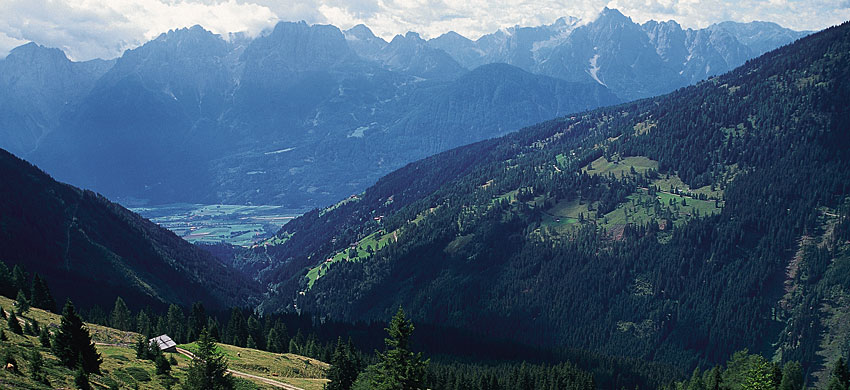
With its 12,000 inhabitants, Lienz is the largest town in the Osttirol, and is a destination not to be missed. It is nicknamed the city of sunshine because on average the sun shines for over 2000 hours a year, a rarity in Austria. Visit the central square, where Liebburg Castle, the symbol of the city, stands and don’t miss the nearby Bruck Castle, built by the Count of Gorizia over 750 years ago.
At weekends, the city market is held in the old town centre, where you can buy everything and taste many local gastronomic specialities. Lovers of outdoor sports, on the other hand, can enjoy the Bikepark on the Hochstein, with rides to suit all tastes. And if you are still not convinced, you might finally think about visiting Lienz for the Olala street festival or for the Dolomitenmann, a well-known extreme sports event.

Schloss Tratzberg is one of the things to see in Tyrol that will leave you breathless. First of all for its enormous size, a good 5000 square metres, and then for its beauty. The castle dates back to the 13th century and is located on the top of a slope. When you visit it, you cannot fail to be amazed by the richly decorated courtyard, the rooms with original furniture from the 16th century and the splendid rooms, including the Frauenstüberl (women’s room) and the Habsburgersaal (Habsburg Hall) with 148 portraits hanging on the walls.
Today, Schloss Tratzberg is a perfect example of Alpine Gothic-Renaissance style and still belongs to the descendants of Empress Maria Theresia. You can take part in a guided tour of the castle, which also includes a virtual journey to discover all 500 years of history of this fascinating building.
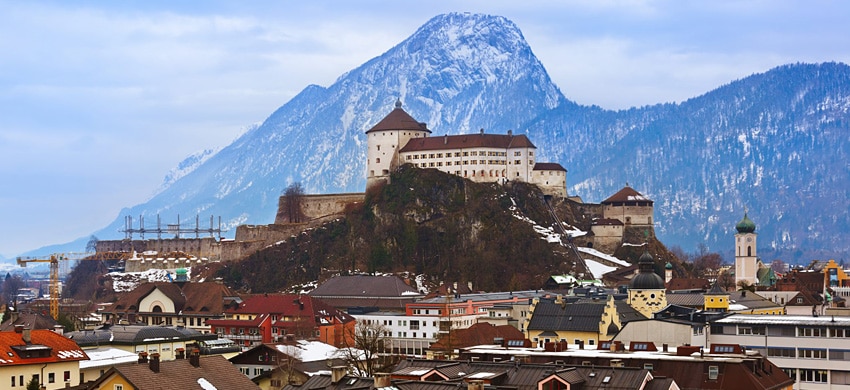
Among the multitude of Tyrolean towns and villages, we have chosen to mention Kufstein, thanks above all to its fortress, dating back to 1200, situated on a rocky spur high above the river, which can be reached on foot or by an impressive glass cable car. It resisted for 300 years before being conquered by Maximilian I in 1504, who enriched its defences by installing drawbridges and loopholes, and building tunnels and the great tower. Throughout its history, the Kufstein fortress has also served as a prison, while today, as the undisputed symbol of the town, it is a museum tracing its history, but is also used for exhibitions or concerts.
After visiting the fortress, walk through the historical centre of Kufstein, with its beautiful pedestrian streets, among which the Römerhofgasse stands out; in the central square, the Stadtplatz, you will find the splendid town hall. Don’t miss St. Vitus Church, the oldest church in the town, dating back to 1400 and built first in Gothic style, later converted to Baroque.
In the following map you can see the location of the main places of interest mentioned in this article.
